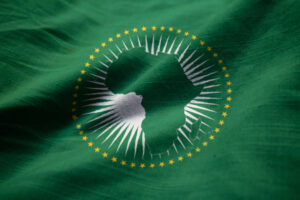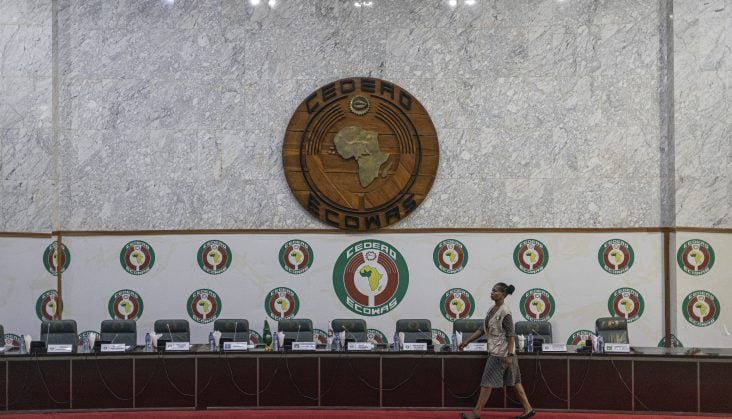Burkina Faso’s Convoy: Rolling Through Hazards, Hurdles, and Heartfelt Gratitude to Reach Niger
New development — approximately 300 trucks carrying essential supplies, including food, crossed the border from Burkina Faso into Niger, with a significant number reaching the capital city, Niamey, on Sunday21 August . This information was shared by a customs official responsible for the region.
Niger has been grappling with a series of sanctions following the July coup, which are intended to exert pressure on the presidential guard for the reinstatement of the ousted president. These measures encompass reductions in aid, disruptions in food supplies, and even power cuts. However, amidst these challenges, Burkina Faso has demonstrated its unwavering support for Niger by dispatching a convoy of several hundred trucks laden with vital provisions that have now reached Niamey.

The convoy embarked on its journey from Burkina Faso, the sole remaining open border with Niger since the imposition of sanctions by the West African regional bloc subsequent to the military uprising that toppled Niger’s president last month. Yet, the path linking Burkina Faso and Niger traverses areas inhabited by various militant groups, making it hazardous for road travel. Consequently, both nations’ armed forces have been providing necessary escort services to ensure safe passage.
A Nigerien truck driver recounted the journey, stating, ‘We originated in Ouagadougou, Burkina Faso. The journey took two days to complete. In Kaya, also in Burkina Faso, we spent 20 days awaiting the convoy’s arrival and subsequent escort to Dori. After spending two days in Dori, Niger soldiers arrived to accompany us to Tera, where we spent another day. From Tera, we have now successfully entered Niger. We express our gratitude to the soldiers who facilitated our peaceful arrival in Niger,’ said Isamaila Mahamadou, a Nigerien driver
African Union Suspends Niger Following Coup, Urges Restoration of Constitutional Order
The African Union (AU) has announced the suspension of Niger from its activities in response to a recent military coup. The AU issued a statement on Tuesday, reiterating its call for the release of elected President Mohamed Bazoum and for the coup leaders to return to their barracks.

The Peace and Security Council (PSC) of the AU convened on August 14, 2023, to discuss the situation in Niger. In a press release on August 22, 2023, the PSC expressed support for ECOWAS’ efforts to restore constitutional order in Niger.
As a consequence of the coup, Niger’s participation in all AU activities and institutions has been immediately suspended until constitutional order is restored. The AU urged member states and the international community not to legitimize the junta in Niger. The council also appealed to the coup leaders to release President Bazoum and collaborate with ECOWAS and the AU for a peaceful and swift return to constitutional governance.
Additionally, the AU Commission has been tasked with appointing a High Representative to aid ECOWAS mediation efforts, and the Nigerien people have been called upon to remain calm during this challenging period.
The sanctions imposed on Niger after the recent coup are taking a toll on its people. Economic activities have been disrupted due to suspended transactions and frozen assets, leading to job losses and financial instability. Basic services like healthcare and education are at risk due to limited resources. The country faces the possibility of defaulting on its debts, which could have long-term consequences. Energy supply shortages, disrupted trade, and reduced aid also negatively impact the population. These sanctions are not just political moves; they’re directly affecting the lives and well-being of Niger’s citizens, exacerbating challenges in an already fragile context.

The Human Toll of Sanctions on Niger: A Call for Balance in Political Actions
Since the coup in July, Niger has been subjected to a series of sanctions aimed at pressuring the presidential guard to reinstate the deposed president. These measures include electricity cuts, aid reduction, and food supply disruptions. While these sanctions have garnered support from prominent entities such as the EU, ECOWAS, UN, and World Bank, it raises the crucial question: where does the well-being of the people fit into these political decisions?
While the intention behind these sanctions might be seen as justifiable, it’s important to critically examine their human impact. Are these sanctions designed to provoke the citizens or to frustrate the coup leaders? Where lies the humane foundation of such decisions, especially in a country that already struggles on a regular day?
Previously referred to as “blockades” during the Nigeria civil war, this practice has been repurposed and wielded as a potent weapon in today’s geopolitical landscape. Unlike the past, where British involvement was doubted, this time the sanctions have been renamed and used as an effective tool of warfare. One might speculate that nations like Russia are better equipped to withstand such actions due to their preparedness and countermeasures.
Yet, the fundamental question remains: should the well-being of the people not be at the forefront of every decision? Should there not be ethical boundaries drawn for the sake of the innocent, be they children, women, or men? The sanctions imposed on Niger are poised to exacerbate an already critical situation, and it is evident that those implementing these measures are cognizant of this fact.
The implications are twofold. Not only could these measures overwhelm the current leadership with a calculated crisis, but they could also foster a public sentiment that rejects the coup leaders for plunging the nation into an avoidable turmoil. It’s imperative to acknowledge that while political agendas might be paramount, they should never come at the cost of human suffering.
In conclusion, the deployment of sanctions requires a more balanced approach. The impact on the general population must be a paramount consideration. Perhaps it’s time to reconsider the terminology used—instead of referring to these measures as “aid,” which can be misleading, let’s call them what they are: a double-edged sword, a “kanata.” By being transparent about the true nature of these actions, we empower the people to make informed decisions about their acceptance or rejection. After all, the well-being of every individual should be non-negotiable, regardless of the political climate.
Sanctions against Niger in the aftermath of the coup are wide-ranging and impactful:
ECOWAS Sanctions: Niger faces severe sanctions from the Economic Community of West African States (ECOWAS) and the West African Monetary and Economic Union. These measures include:
- Immediate suspension of all commercial transactions with Niger.
- Freezing of state assets in the regional central bank.
- Freeze on state and state enterprise assets in commercial banks.
- Suspension of financial assistance from regional development banks. These financial restrictions raise concerns about Niger’s ability to meet debt obligations. Additionally, a planned 30 billion CFA francs bond issuance by Niger in the regional debt market has been canceled, hampering their financial plans.
Regional Power Impact: Niger’s neighboring nations respond to the coup with actions like:
- Nigeria ceasing power supply via the Birnin-Kebbi line.
- Ivory Coast halting imports and exports of Nigerien goods.
EU Sanctions: The European Union, a major contributor to Niger, takes immediate action by:
- Suspending financial support and cooperation on security.
- Withholding a substantial allocation of 503 million euros from its budget, originally designated to enhance governance, education, and growth in Niger over 2021-2024.
French Response: France, a significant partner to Niger, takes strong measures, including:
- Suspending development aid and budget support.
- Insisting on a swift return to constitutional order. France’s aid, which amounted to about 120 million euros in 2022, holds vital importance to Niger’s development. Furthermore, the presence of French troops in Niger adds to the complexity of the situation.
Other International Reactions:
- The Dutch government temporarily suspends direct cooperation in development and security programs.
- The United States halts humanitarian and security aid valued at over $100 million, emphasizing the need for the junta to restore the elected government. The U.S. also warns that further cooperation could be suspended.
- Canada suspends direct development assistance and backs ECOWAS’ mediation efforts.
- The World Bank suspends disbursements, except for private-sector partnerships that continue cautiously. Niger’s substantial World Bank portfolio and recent budget support are now on hold, potentially hampering developmental projects.
Overall, the sanctions imposed on Niger following the coup involve a broad spectrum of nations and organizations, impacting various sectors including finance, energy, development, and security.

Leave a Reply
You must be logged in to post a comment.